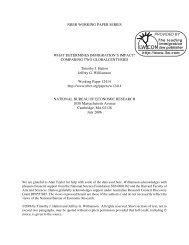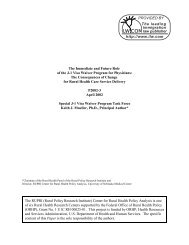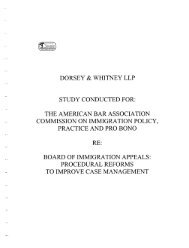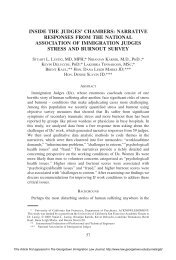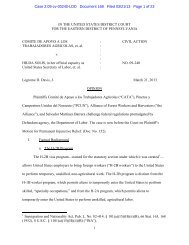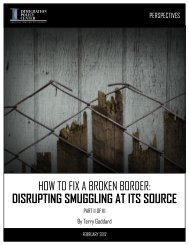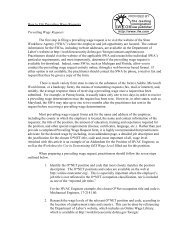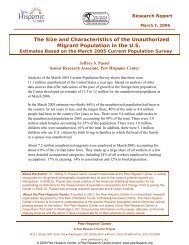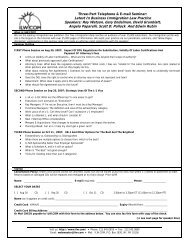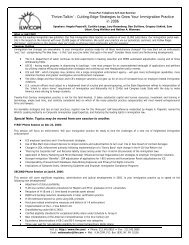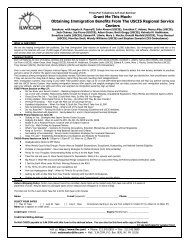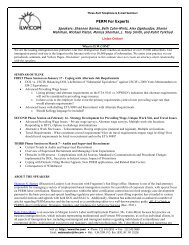The New Battleground - ILW.com
The New Battleground - ILW.com
The New Battleground - ILW.com
You also want an ePaper? Increase the reach of your titles
YUMPU automatically turns print PDFs into web optimized ePapers that Google loves.
THE NEW BATTLEGROUND<br />
IMMIGRATION IN THE STATES — THE OUTLOOK FOR BUSINESS<br />
IN the wake of Congress’s 2007 failure to pass <strong>com</strong>prehensive immigration<br />
reform, state authorities have rushed to fill the vacuum. Nothing they do can<br />
fix the broken immigration system – only Congress can do that. So they have<br />
done the one thing in their power: crack down harder – with more aggressive<br />
enforcement, new restrictions, new more punitive penalties. <strong>The</strong> consequences<br />
are being felt across the nation, in workplaces and immigrant neighborhoods.<br />
But nearly a year later, there are signs that some state lawmakers are questioning<br />
this approach – starting to see that while enforcement is a critical piece of the<br />
answer that’s needed, enforcement alone will not solve the problem.<br />
State lawmakers started this year’s legislative sessions much the way they<br />
started last year’s: with a flood of bills targeting illegal immigration and<br />
businesses found to have hired unauthorized workers.<br />
During the first quarter of 2008, according to the National Conference of State<br />
Legislatures, more than 1,100 immigration-related bills were introduced in 44<br />
states. <strong>The</strong> number of measures is <strong>com</strong>parable to the number introduced last<br />
year, when anti-immigration sentiment surged and states across the country<br />
<strong>com</strong>peted to produce the toughest and most sweeping legislation. And it was<br />
widely expected that the momentum of new laws and new sanctions would only<br />
grow in 2008. But the results of this spring’s legislative sessions have been more<br />
tempered than anticipated.<br />
With most state sessions winding down, only six states have passed<br />
immigration laws that directly affect businesses. And many of the most<br />
severe proposals were defeated or scaled back after employer groups<br />
lobbied lawmakers to reconsider the economic effects of harsh penalties<br />
and burdensome regulations.<br />
Still, the battle is far from over.<br />
June 10, 2008
Stepping back from the brink<br />
Lawmakers around the country campaigned last year on a<br />
promise to crack down on employers who hire illegal immigrants,<br />
and many began the session determined to pass something they<br />
could take back to their constituents. But in several states,<br />
pragmatic legislators worked with immigrant advocates and<br />
business groups to craft legislation that would target egregious<br />
offenders without undermining the prosperity of the state.<br />
In Virginia, a coalition of trade groups was able to block<br />
legislation that would have required all employers in the state to<br />
use the federal E-Verify system to confirm workers’ immigration<br />
status. <strong>The</strong> business groups worked successfully with legislators<br />
to develop an alternative measure that did not impose additional<br />
burdens on <strong>com</strong>panies making a good-faith effort to <strong>com</strong>ply with<br />
the law but still allowed lawmakers to show constituents they<br />
were taking steps to fight illegal immigration.<br />
Business also made progress in Arizona, where lawmakers<br />
produced new legislation amending the tough employer<br />
sanctions bill passed in the state last year, one of the nation’s<br />
most punitive immigration laws. This year’s changes, signed into<br />
law in May by Democratic Gov. Janet Napolitano, provide some<br />
clarification and relief for businesses facing new restrictions<br />
and penalties.<br />
Contrary to expectations that many states would move this year<br />
to enact their own versions of the tough statutes passed last year<br />
in Arizona and Oklahoma, in fact few legislatures did. Business<br />
coalitions emerged in several states to fight back against<br />
proposed enforcement measures, and though they didn’t always<br />
win, they showed it is possible to find legislative allies and craft<br />
<strong>com</strong>promises that employers can live with.<br />
In Indiana and Kentucky, legislation was proposed and debated,<br />
but then defeated, thanks in part to efforts by business groups<br />
to demonstrate the economic consequences for the state.<br />
Employment-related bills were also discussed in Iowa, Idaho,<br />
Kansas, Tennessee and Wisconsin but then ran into obstacles<br />
or simply ran out of steam, and lawmakers in all five states went<br />
home without passing anything.<br />
In Missouri and South Carolina, hardliners determined to mandate<br />
E-Verify for all employers battled for months with more pragmatic<br />
lawmakers. Both states passed measures in the final days of<br />
their legislative sessions. But neither new statute requires all<br />
businesses to enroll in E-Verify – and in South Carolina,<br />
checking an employee’s driver’s license will be enough to<br />
<strong>com</strong>ply with the law.<br />
State Immigration Laws<br />
That Target Employers<br />
Outlaws knowingly hiring<br />
unauthorized immigrants<br />
Revokes business licenses of<br />
employers who knowingly<br />
hire unauthorized workers<br />
Requires all employers in<br />
the state to use E-Verify<br />
Requires businesses<br />
contracting with the state<br />
to use E-Verify<br />
Shelters employers who use<br />
E-Verify from prosecution<br />
for knowingly hiring<br />
unauthorized immigrants<br />
Threatens employers who<br />
violate state immigration<br />
law with fines and jail<br />
Outlaws harboring or<br />
transporting illegal<br />
immigrants, with potential<br />
implications for employers<br />
Prohibits employers<br />
from deducting wages<br />
paid to unauthorized<br />
immigrants on their<br />
state in<strong>com</strong>e tax returns<br />
Makes it a felony to work<br />
illegally<br />
Allows terminated employees<br />
to sue if they are replaced by<br />
illegal immigrants<br />
Prepared by Greg Siskind<br />
AZ, CO, MO, MS,<br />
NH, SC, TN, WV<br />
AZ, MO, MS, SC,<br />
TN, VA, WV<br />
AZ, MS<br />
AZ, CO, GA,<br />
MN † , MO, MS,<br />
OK, RI † , UT<br />
AZ, MO, MS,<br />
OK, SC, TN<br />
CO, MO, MS ‡ ,<br />
OK, SC, WV<br />
MO, OK, SC, UT<br />
GA, CO, MO,<br />
SC, WV<br />
MS<br />
OK, MS, SC, UT<br />
†<br />
In MN and RI, E-Verify is mandated by executive order,<br />
not legislation<br />
‡<br />
MS law opens unauthorized workers<br />
to felony charges, which may in turn<br />
implicate employers<br />
SPRING 2008 2
SOME BAD NEWS<br />
FOR BUSINESS<br />
But while employer groups were able<br />
to hold off the worst in several states,<br />
the news was not all good for business<br />
this spring.<br />
Mississippi legislators passed one of<br />
the nation’s harshest employmentrelated<br />
immigration laws. Under the<br />
new measure, signed by Republican<br />
Gov. Haley Barbour in March, all<br />
employers in the state are required<br />
to use E-Verify. Businesses can have<br />
their licenses revoked for violating<br />
immigration laws and – for the first<br />
time in any state – unauthorized<br />
workers can be charged with a felony<br />
for accepting work in Mississippi.<br />
Some believe the law could also<br />
impose felony penalties against<br />
employers who hire illegal workers.<br />
Mississippi was also at the forefront<br />
of one of the year’s most troubling<br />
trends: laws giving authorized<br />
employees a “private right of action”<br />
– allowing U.S. citizens and<br />
permanent residents to sue their<br />
employers if they are fired and<br />
replaced by unauthorized workers.<br />
Oklahoma pioneered this idea in<br />
2007, Utah and South Carolina<br />
enacted similar provisions this year,<br />
and other states are expected to<br />
follow suit in 2009.<br />
In another new trend of concern to<br />
business, governors are stepping out<br />
ahead of their legislatures, issuing<br />
executive orders that crack down on<br />
illegal immigration. Orders signed<br />
this spring by Rhode Island Gov.<br />
Donald Carcieri (R) and Minnesota<br />
Gov. Tim Pawlenty (R) require state<br />
contractors to enroll in E-Verify, and<br />
the order in Minnesota mandates that<br />
state employees also be screened.<br />
Meanwhile, lawmakers in states that<br />
proved unable to pass employmentrelated<br />
immigration bills vowed to<br />
continue the fight next year.<br />
“We’ll stay at it,” Virginia legislator<br />
Paul F. Nichols (D) told the<br />
Washington Post. “We’re not<br />
going to give up.”<br />
Lawmakers and employers, those<br />
in favor of the new laws and those<br />
against, all share a <strong>com</strong>mon<br />
prediction for the year or two ahead.<br />
Until Congress passes immigration<br />
reform, states will continue to take<br />
matters into their own hands. While<br />
federal law says that the hiring of<br />
unauthorized workers is a matter for<br />
Congress, not the states, to regulate,<br />
political pressure at the state level is<br />
forcing lawmakers to push for cracking<br />
down. And with Congress unlikely to<br />
pass a broad overhaul in the year or<br />
two ahead – and a new White House<br />
expected to focus attention on other<br />
issues – states will continue to lead<br />
the legislative effort to make it<br />
harder for businesses to hire<br />
unauthorized workers.<br />
BYPASSING CONGRESS – A LEGAL GRAY AREA<br />
Many legal experts say the bills being passed in state capitals are not<br />
constitutional, and many of the new laws are being challenged in court.<br />
<strong>The</strong> U.S. Constitution gives federal law “supremacy” over state statutes.<br />
<strong>The</strong> 1986 Immigration Reform and Control Act (IRCA) explicitly prohibits<br />
states from imposing sanctions on businesses that hire unauthorized<br />
workers. But one phrase in the 1986 law – a seven-word parenthesis<br />
allowing states some leeway in the matter of “licenses and similar laws”<br />
– has created a contested gray area.<br />
Many states have taken the IRCA parenthesis to mean they have the<br />
authority to suspend or revoke the business licenses of employers who<br />
hire unauthorized workers. Businesses and many constitutional<br />
lawyers disagree.<br />
“You have this <strong>com</strong>plex overlay of statutes and regulations and court<br />
cases, and you’ve got this federalism question of what has traditionally<br />
been federal power and what the states can do,” Jan Ting, a Temple<br />
University law professor, told the Washington Post. “<strong>The</strong>re could not be<br />
an area of law that is less clear than this.”<br />
Because states have until recently stayed away from imposing sanctions<br />
for immigration violations, federal preemption has rarely been tested<br />
and few court precedents exist.<br />
But that is changing. As more and more states enact employmentrelated<br />
immigration laws, many are expected to end up in court.<br />
“<strong>The</strong>re could not be an area of law<br />
that is less clear than this.”<br />
~ Jan Ting, Temple University Law Professor<br />
SPRING 2008 3
Regulating business<br />
E-Verify. <strong>The</strong> most <strong>com</strong>mon regulation<br />
states have imposed on businesses in<br />
recent years is requiring employers to<br />
use the federal E-Verify system to confirm<br />
workers’ immigration status. Last year<br />
Arizona and this year Mississippi<br />
mandated that all employers – public<br />
and private – enroll in the program.<br />
This year, the governors of Rhode<br />
Island and Minnesota signed executive<br />
orders requiring state contractors to do<br />
so. Colorado, Georgia, Oklahoma and<br />
Utah also mandate it for contractors<br />
doing business with the state.<br />
Georgia, Minnesota, North Carolina<br />
and Oklahoma require public employers<br />
to use it. Minnesota’s executive order<br />
mandates that all state employees be<br />
screened. Minnesota also provides<br />
state subsidies and other economic<br />
incentives to businesses that enroll in<br />
the program.<br />
When Illinois went in the other direction<br />
last year, it was a stark exception to<br />
the national trend. <strong>The</strong> state enacted<br />
legislation that prohibits employers<br />
from using E-Verify on the grounds<br />
that it is riddled with errors and likely to<br />
impose burdens on U.S. citizens. <strong>The</strong><br />
Department of Homeland Security has<br />
sued the state to overturn the law, and<br />
Illinois has agreed not to enforce it until<br />
the case is decided.<br />
But this year, lawmakers in several<br />
states are hesitating to mandate use of<br />
the federal screening system. Though<br />
both Missouri and South Carolina<br />
considered making it obligatory for<br />
all employers, in the end Missouri will<br />
require it only of state agencies and<br />
state contractors, while South Carolina<br />
will give businesses a choice: using<br />
E-Verify or checking employees’ drivers’<br />
licenses. And Virginia lawmakers flatly<br />
rejected demands that they mandate<br />
enrollment for any employers.<br />
Another growing trend: more and more<br />
states are passing measures that<br />
shelter employers who use E-Verify<br />
and other employment verification from<br />
prosecution if they are found to be<br />
employing unauthorized workers.<br />
LAWSUITS<br />
Two lawsuits now making their way through the federal court system<br />
could restrict states’ ability to continue to crack down on businesses that<br />
hire unauthorized workers.<br />
One is a court challenge to the 2007 Arizona employer sanctions law filed<br />
by a coalition of Arizona trade groups. In February, a federal judge denied<br />
the coalition’s request to delay implementation of the law with a temporary<br />
restraining order, and the plaintiffs took their case to the U.S. Ninth Circuit<br />
Court of Appeals. Oral arguments are scheduled for this summer and a<br />
decision is expected in the fall.<br />
Another lawsuit making its way through the federal courts originated last<br />
year in Hazleton, PA, where a local ordinance enacted in 2006 denies<br />
business permits to employers who hire illegal immigrants and fines<br />
landlords who rent to them. In a ruling issued last summer, a federal<br />
judge struck down the Hazleton ordinance, saying it treads on federal<br />
terrain and violates illegal immigrants’ constitutional right to due process.<br />
<strong>The</strong> town is appealing the decision, and the case will be heard in the U.S.<br />
Third Circuit Court of Appeals this<br />
summer. A decision in this case is also<br />
expected in the fall.<br />
If the two appellate courts hand down<br />
similar rulings – either both upholding<br />
the local laws, or both asserting federal<br />
authority – the battle over federal<br />
preemption could end there.<br />
<strong>The</strong> debate may go all<br />
the way to the Supreme<br />
Court. <strong>The</strong> consequence:<br />
no clear direction for<br />
state lawmakers for at<br />
least a year or two.<br />
But if the courts hand down opposing decisions – one supporting state<br />
authority and the other backing federal preemption – the debate will likely<br />
go to the Supreme Court. <strong>The</strong> consequence: no clear direction for state<br />
lawmakers for at least a year or two.<br />
In the meantime, with the cases winding their way through the courts and<br />
Congress steering clear of the issue, states continue to press ahead.<br />
SPRING 2008 4
Arizona, for example, offers some<br />
protection to <strong>com</strong>panies that use E-Verify<br />
for new hires and the federal Social<br />
Security Number Verification System<br />
for those employed before 2008.<br />
Executive orders. Developments in<br />
Rhode Island and Minnesota, where<br />
governors have enacted executive<br />
orders requiring E-Verify, have left<br />
many businesses fearful that other<br />
state executives will begin imposing<br />
regulations without the input or<br />
approval of their legislatures.<br />
Republican Gov. Mark Sanford of<br />
South Carolina tried to take matters<br />
into his own hands in May, urging<br />
voters to <strong>com</strong>e down to the statehouse<br />
and lobby legislators he disagreed<br />
with. And Republican Gov. Matt Blunt<br />
of Missouri threatened to call the<br />
state legislature back into session<br />
if lawmakers went home without<br />
passing an employer sanctions bill.<br />
Private right of action. While E-Verify<br />
requirements have so far proven the<br />
most popular method to deter the<br />
hiring of illegal immigrants, some<br />
states are beginning to make use of<br />
another tool: giving employees a<br />
“private right of action.” Oklahoma was<br />
the first state to pass such legislation,<br />
in 2007, allowing fired U.S. workers<br />
to sue their employers if unauthorized<br />
workers were subsequently found to<br />
be working in their place.<br />
Mississippi, Utah and South Carolina<br />
followed with similar provisions this<br />
year, allowing fired workers to sue<br />
if they are then replaced by illegal<br />
immigrants. Some say the laws could<br />
open businesses to lawsuits if they<br />
employ any unauthorized workers,<br />
whether or not they have hired them to<br />
replace fired legal workers. Other states<br />
are expected to adopt this approach<br />
next year.<br />
Felony laws. Businesses are also<br />
worried about the precedent set this<br />
spring in Mississippi: a measure<br />
– the first ever in any state – that<br />
makes it a felony for illegal<br />
immigrants to accept unauthorized<br />
employment. Violators are subject to<br />
imprisonment from one to five years<br />
and fines of between $1,000 and<br />
$10,000. And while the measure<br />
seemingly applies only to<br />
unauthorized workers, many fear<br />
that the businesses that hire them<br />
could also be prosecuted for aiding<br />
and abetting a felony.<br />
Oklahoma also imposed felony<br />
penalties, in 2007 – in that case,<br />
against anyone caught transporting,<br />
concealing, harboring or sheltering<br />
illegal immigrants in any location,<br />
including any building or means<br />
of transportation. Utah, Missouri<br />
and South Carolina passed similar<br />
measures this year, and many<br />
fear the provisions could be used<br />
against employers who knowingly<br />
hire unauthorized workers.<br />
“FIXING” ARIZONA<br />
CASE STUDY<br />
ARIZONA EMPLOYERS STRUGGLE<br />
WITH LABOR SHORTAGES<br />
After a flood of <strong>com</strong>plaints from business,<br />
Arizona lawmakers passed a bill<br />
this spring that clarifies the tough employer<br />
sanctions law passed in the state<br />
last year. <strong>The</strong> goal of the new measure:<br />
to tighten the 2007 law but also provide<br />
some protections for well-intentioned<br />
employers. Most importantly, the<br />
new measure makes clear that the<br />
employment provision in last year’s bill<br />
applies only to workers hired after Jan.<br />
1, 2008. Under the original language,<br />
businesses faced tough new sanctions<br />
for unauthorized workers hired before<br />
the law went into effect.<br />
Those penalties remain in place in cases<br />
of workers hired since Jan. 1, 2008: a<br />
10-day suspension of business licenses<br />
for a first offense and a permanent revocation<br />
of licenses on a second offense.<br />
Nothing frightens a small business owner more than uncertainty – and<br />
it would be hard to imagine a more uncertain business climate than<br />
Arizona in the last twelve months.<br />
<strong>The</strong> employer sanctions law passed in July 2007 was alarming<br />
enough, but then came the confusion. Would the court challenge filed<br />
by a coalition of trade groups succeed in overturning the new law?<br />
Would a federal judge issue a restraining order to delay its implementation?<br />
Would the legislature amend the statute – and if so, how<br />
exactly? And would that push anti-immigrant groups to put a still more<br />
punitive employer sanctions measure on the ballot in November?<br />
SPRING 2008 5
Also still in place: provisions mandating<br />
that all businesses in Arizona enroll in<br />
E-Verify and allowing prosecutors to<br />
investigate anonymous tips made<br />
against businesses alleged to be<br />
employing unauthorized workers.<br />
<strong>The</strong> 2008 law provides some new legal<br />
protections for businesses that check<br />
the immigration status of workers hired<br />
before Jan. 1 through the Social Security<br />
Number Verification Service. And<br />
employers were relieved by the way<br />
the new measure limits the liability of<br />
<strong>com</strong>panies with multiple work sites: as<br />
long as each site holds its own business<br />
license, a violation at one site applies<br />
only to that location and does not affect<br />
the other workplaces.<br />
But employers were disappointed that<br />
the new law did not eliminate last year’s<br />
provision permitting prosecutions on the<br />
basis of anonymous <strong>com</strong>plaints and by<br />
the provision on independent contractors.<br />
Businesses remain liable if their<br />
contractors employ unauthorized workers.<br />
Employers are also concerned that this<br />
year’s changes may not prevent an<br />
anti-immigration voter initiative from<br />
appearing on the ballot in November,<br />
as lawmakers had hoped.<br />
Still, Arizona employers were encouraged<br />
by the tone of the 2008 debate – less<br />
punitive and less one-sided than it was<br />
in 2007. Legislators on both sides of the<br />
aisle seem increasingly aware of the<br />
likelihood that an enforcement-only<br />
approach will create labor shortages<br />
in Arizona. And lawmakers are now<br />
considering legislation that would ask<br />
Congress’s permission for an Arizonaonly<br />
temporary worker program. <strong>The</strong><br />
proposal would not apply to unauthorized<br />
workers already in Arizona. But it<br />
would allow qualifying <strong>com</strong>panies to<br />
recruit workers in Mexico for a two-year<br />
term of employment. Many doubt that<br />
Employers stopped trying to predict and prepared for the worst. Jason<br />
LeVecke, owner of more than 65 fast-food restaurants, said he would<br />
not open any new stores in Arizona until the law was clarified.<br />
Richard Melman, a Chicago-based restaurateur with 75 businesses<br />
across the country, pulled the plug on an Asian-themed restaurant in<br />
Scottsdale, although he had already invested nearly $100,000 in<br />
architects and designers.<br />
“You put in $3 million or $4 million, and you can be shut down for a<br />
mistake.” Melman told the Arizona Republic. “Why take a chance?<br />
I want to see how [the law] plays out.”<br />
<strong>The</strong> new employer sanctions were not the only threat. Unlike in other<br />
states – Massachusetts, Texas, Iowa – there have been no high-profile<br />
federal raids in Arizona, yet. But like employers everywhere, Arizona<br />
business owners are anxiously awaiting the out<strong>com</strong>e of the federal court<br />
battle over the Department of Homeland Security’s proposed Social Security<br />
No-Match rule, which would create new legal liabilities for employers who<br />
fail to make sure that their employees are in the country legally.<br />
<strong>The</strong> consequences of an ‘attrition’ strategy<br />
Meanwhile, the state legislative battle has played out against a backdrop<br />
of rising fear. <strong>The</strong> new employment-related law is just one piece of<br />
a larger strategy known among anti-immigrant activists as “attrition.” <strong>The</strong><br />
next best thing in hardliners’ minds to deporting the state’s half million<br />
undocumented residents, this approach sets out to make their lives so<br />
miserable that they leave the country voluntarily. <strong>The</strong> other two pillars<br />
of the strategy: laws depriving unauthorized immigrants of government<br />
benefits and a campaign of draconian street sweeps.<br />
Maricopa Country Sheriff Joe Arpaio has led the charge in the streets.<br />
A typical operation – and they have be<strong>com</strong>e <strong>com</strong>monplace in Latino<br />
neighborhoods – involve a squad of officers, marked and unmarked cars<br />
and a hovering helicopter. Officers stop drivers for small infractions –<br />
a broken tail light is enough –<br />
to inquire about their immigration<br />
status. <strong>The</strong>n they arrest and<br />
deport those who cannot prove<br />
they are in the state legally.<br />
<strong>The</strong> result: over the past year,<br />
some 7000 unauthorized<br />
immigrants have been<br />
detained in Maricopa Country.<br />
And now anti-immigrant<br />
vigilantes are getting in on the<br />
act: photographing license<br />
plates at day labor centers and<br />
turning them over to Arpaio.<br />
In this climate, some employers<br />
are eager to enroll in the<br />
federal E-Verify system now<br />
mandated by state law for all<br />
employees hired after Jan. 1, 2008 –<br />
at least it offers a measure of certainty.<br />
SPRING 2008 6
Washington would grant approval for<br />
a stand-alone program in a single<br />
state. Still, Arizona employers are<br />
encouraged by the strong support<br />
the proposal has received from both<br />
Democrats and Republicans. And<br />
business groups hope that passage<br />
of the measure will send a signal to<br />
Washington, prompting faster federal<br />
action on <strong>com</strong>prehensive immigration<br />
reform – especially if similar temporary<br />
worker programs are enacted next<br />
year in other states.<br />
BUSINESS PUSHES BACK<br />
As states increasingly target<br />
employers, business coalitions are<br />
forming to fight back. In state after<br />
state, the threat of legislation has<br />
prompted trade groups from an array<br />
of sectors to form a united front to<br />
make their case to legislators and<br />
the local media. Some of these<br />
coalitions are ad hoc and transient,<br />
others digging in for a longer haul.<br />
Some are focused solely on state<br />
matters, others also looking ahead to<br />
the Congressional immigration debate.<br />
And as proponents of punitive<br />
enforcement policies have been<br />
<strong>com</strong>municating and sharing ideas<br />
from state to state, so now business<br />
coalitions too are starting to learn from<br />
each other.<br />
Fifteen percent of state’s 150,000 employers have signed up for the<br />
program so far.<br />
One Phoenix restaurant owner, who asked that his name not be used,<br />
explained his reasoning. “My hands shake whenever I fill out an I-9<br />
form,” he said. “I haven’t been this upset about legislation since I started<br />
doing business here two decades ago.”<br />
“<strong>The</strong> real zinger,” he explained, “is the anonymous <strong>com</strong>plaints. Allowing<br />
<strong>com</strong>plaints to be made anonymously just opens up a Pandora’s Box.”<br />
<strong>The</strong> restaurateur grumbled about the E-Verify enrollment procedure: a<br />
three- to four-hour training session, followed by a test. Still, he said he<br />
will use the system as long as it protects him against “the INS crashing<br />
down my door.”<br />
Others are less happy with the program: Ken Nagel, co-owner of the<br />
Aunt Chilada’s and the Rustler’s Rooste restaurants in Phoenix, recently<br />
hired one of his own daughters – who was born in the United States – to<br />
work for him. But when he ran her information through E-Verify, she<br />
flunked the eligibility check.<br />
Between October 2006 and March 2007, according to the Los Angeles<br />
Times, more than 3,200 foreign-born U.S. citizens nationwide were erroneously<br />
flagged by E-Verify and temporarily disqualified from working.<br />
Meanwhile, with frightened migrants said to be leaving Arizona in large<br />
numbers, the main problem for many businesses is finding workers.<br />
Lettuce growers in Yuma are paying employees between $10 and $19<br />
an hour and are still having trouble harvesting their crops. Steel contractor<br />
Sheridan Bailey estimates that he has lost “four to five million bucks<br />
over a year’s time” in potential business he could not bid on because of<br />
difficulty recruiting a legal labor force.<br />
“In a state with 3 to 5 percent unemployment,” said the Phoenix restaurant<br />
owner, “you’re getting rid of 12 percent of the workforce. <strong>The</strong>re<br />
are a lot fewer people applying for these jobs. By the end of the year, it<br />
could get ugly.”<br />
No wonder, for many employers, the Arizona temporary worker program<br />
moving through the legislature seems almost too good to be true.<br />
Enforcement employers<br />
can live with<br />
Rather than simply say no – rather than<br />
trying to block any and all legislation –<br />
several coalitions cooperated<br />
with lawmakers this spring to craft<br />
enforcement measures that business<br />
could live with. <strong>The</strong> result: <strong>com</strong>promise<br />
bills that allow elected officials to show<br />
constituents that they are cracking<br />
down on illegal immigration but do<br />
not burden employers trying to <strong>com</strong>ply<br />
with federal law.<br />
An ad hoc coalition pioneered this<br />
approach in Georgia in 2006, and a<br />
group in Virginia picked up on it in<br />
preparation for this legislative session.<br />
“We felt it was very important to have<br />
alternative bills,” said Hobey Bauhan,<br />
president of the Virginia Poultry<br />
Federation and a leading member of<br />
his state’s coalition, Virginia Employers<br />
for Sensible Immigration Policy. “We<br />
repeatedly heard from the legislators<br />
we met before the session began<br />
that they had campaigned on the<br />
issue of immigration and they had<br />
to have something they could take<br />
back to their constituents.”<br />
<strong>The</strong> Virginia coalition worked with<br />
lawmakers to develop a <strong>com</strong>promise<br />
measure that goes after CEOs<br />
and other top executives who are<br />
SPRING 2008 7
convicted under federal law of<br />
deliberately and repeatedly hiring<br />
unauthorized workers. <strong>The</strong> new<br />
Virginia statute punishes what Bauhan<br />
calls the “worst of the worst” but<br />
does not threaten employers who<br />
are making a good-faith effort to<br />
<strong>com</strong>ply with the law. It also protects<br />
businesses where rogue managers<br />
In state after state, the<br />
threat of legislation<br />
has prompted trade<br />
groups to <strong>com</strong>e<br />
together in a united<br />
front to make their<br />
case to legislators.<br />
at lower levels have gone out on their<br />
own and hired unauthorized workers.<br />
Virginia business groups also<br />
worked with lawmakers to craft a<br />
<strong>com</strong>promise for businesses that<br />
contract with the state. Rather than<br />
requiring such <strong>com</strong>panies to enroll<br />
in E-Verify, as many states do and<br />
Virginia lawmakers considered, the<br />
new law mandates language in<br />
state contracts affirming that the<br />
contractor will not knowingly hire<br />
unauthorized workers.<br />
Templates for other states<br />
A similar business coalition in South<br />
Carolina worked with legislators to<br />
beat back a measure mandating that<br />
all employers in the state enroll in<br />
E-Verify. One of the <strong>com</strong>promises<br />
they considered: allowing employers<br />
to choose among several methods<br />
of screening workers – the E-Verify<br />
system, I-9 forms, drivers’ licenses<br />
or a new paper-based state program<br />
called SC-Verify. <strong>The</strong> idea behind this<br />
more tempered proposal: lawmakers<br />
could feel secure that businesses<br />
were taking action to weed out<br />
unauthorized workers, while<br />
employers would have options,<br />
allowing them to choose the verification<br />
system that worked best for their<br />
business situation. In the end, the new<br />
statute limits the choice to E-Verify or<br />
drivers’ licenses. Still, the provision<br />
sets a precedent – a potential template<br />
for legislators in other states.<br />
Employers in Arizona came up with<br />
yet a third concept. <strong>The</strong> <strong>com</strong>promise<br />
worked out there and enacted as part<br />
of the bill amending Arizona’s 2007<br />
law is also intended to target “bad<br />
actor” employers but protect those<br />
who try to play by the rules. <strong>The</strong> gist<br />
of the provision: instead of cracking<br />
down further on all employers in the<br />
state, to target those who intentionally<br />
violate immigration law by paying<br />
employees in cash and making a pattern<br />
and practice of avoiding a paper trial<br />
for foreign workers. This measure too<br />
creates a template that can be used in<br />
the future by other states.<br />
What States Require E-Verify<br />
State Measures Year Applies to<br />
1 Arizona HB 2779 2007 all employers, public and private<br />
2 Colorado HB 1343 2006 state contractors<br />
3 Georgia SB 529 2006 state agencies, contractors, and subcontractors<br />
4 Idaho Executive order 2006 state agencies<br />
5 Minnesota Executive order 2008 state agencies, state contracts<br />
6 Mississippi SB 2988 2008 all employers, public and private<br />
7 Missouri HB 1549 2008 public employers, some contractors<br />
8 North Carolina SB 1523 2006 state agencies<br />
9 Oklahoma HB 1804 2007 public employers, contractors, subcontractors<br />
10 Rhode Island Executive order 2008 state agencies, contractors<br />
11 South Carolina H 4400 2008 public employers<br />
12 Utah SB 81 2008 public employers<br />
Prepared by the National Conference of State Legislatures Immigrant Policy Project.<br />
SPRING 2008<br />
8
Changing the climate<br />
In still other states, business coalitions working to educate lawmakers about the potential downsides of employment-related<br />
immigration measures succeeded in creating a climate in which restraint could prevail.<br />
Business groups explained to lawmakers that a patchwork of contradicting state regulations would make it difficult for<br />
<strong>com</strong>panies to operate nationwide. <strong>The</strong>y underscored the burdens that mandating E-Verify could impose on U.S. workers,<br />
whose Social Security records are often inaccurate and who could be wrongfully rejected by the system. And they<br />
pointed out the consequences of the laws passed last year in Arizona and Oklahoma: large numbers of workers, legal<br />
and illegal, fleeing both states and, in Oklahoma, according to the Oklahoma Bankers Association, an estimated price<br />
tag of $1.8 billion a year in lost productivity and wages.<br />
Some lawmakers shrugged off these arguments, saying that was exactly what they wanted – illegal immigrants fleeing their<br />
state in droves. But in other states, lawmakers had second thoughts.<br />
Indiana was well on its way to passing a version of Arizona’s tough 2007 law – requiring all employers to use E-Verify and<br />
revoking the business licenses of those found to be hiring unauthorized workers. But an ad hoc business coalition managed<br />
to sow enough doubt about the unintended consequences of the measure that when a chief sponsor started making tactical<br />
mistakes, fellow lawmakers backed away from the legislation.<br />
So too in Kentucky, business groups were not directly responsible for defeating a measure modeled on Arizona’s. But they<br />
and immigrant advocates raised enough questions about the bill that the chair of the House Judiciary <strong>com</strong>mittee killed it<br />
single-handedly before it could <strong>com</strong>e up for a vote.<br />
STATE IMMIGRATION LEGISLATION<br />
Measures requiring employment verification or imposing penalties on employers<br />
Prepared by the National<br />
Restaurant Association<br />
SPRING 2008<br />
9
OUTLOOK<br />
While businesses have won a number<br />
of battles against new immigration<br />
regulations this year, and legal action<br />
against state laws is moving forward,<br />
state legislative efforts to impose<br />
strict penalties and stop businesses<br />
from hiring unauthorized workers<br />
are far from over.<br />
Autumn surprises – and next year<br />
Several state legislatures still have<br />
weeks left in their sessions and are<br />
continuing to consider immigration<br />
proposals. And in many states, even<br />
the end of the session will not spell<br />
certain relief. With the economic<br />
slowdown cramping business and<br />
cutting into tax revenues, legislatures<br />
in several states are expected to<br />
reconvene for special sessions in the<br />
fall. And the must-pass budget bills<br />
likely to move in such sessions will<br />
make appealing targets for lawmakers<br />
seeking to attach immigration<br />
enforcement provisions.<br />
Meanwhile, lawmakers in other states<br />
are already looking ahead to next year.<br />
In Texas, which had no legislative<br />
session this winter, Republicans are<br />
busy preparing for January 2009.<br />
Among the measures they are<br />
considering: penalties for businesses<br />
that knowingly hire illegal immigrants,<br />
ending public assistance for those in<br />
the state illegally, empowering state<br />
and local police to enforce federal<br />
immigration law, making English the<br />
official language of Texas, barring<br />
illegal immigrants from filing lawsuits,<br />
challenging the Constitutional right<br />
of birthright citizenship for immigrant<br />
children born in the U.S. and taxing<br />
the estimated $6 billion in remittances<br />
that immigrants send every<br />
year from Texas to Mexico.<br />
Illegal immigration is also expected<br />
to be high on the agenda next year<br />
in Alabama, Florida, <strong>New</strong> Jersey,<br />
North Carolina and Missouri, among<br />
other states.<br />
CASE STUDY<br />
A Seat at the Table in Virginia<br />
At the start of 2008, lawmakers in the Virginia state legislature<br />
introduced more than 100 bills aimed at cracking down on<br />
illegal immigration. Among the measures directly targeting<br />
employers, some threatened to close down businesses found<br />
to be hiring illegal immigrants. Others would have mandated<br />
use of the federal E-Verify system.<br />
But while many Virginia<br />
lawmakers campaigned<br />
last year promising to do<br />
something about illegal<br />
immigration, only a handful<br />
of immigration-related<br />
proposals were approved<br />
by the legislature. Only two<br />
of the new laws affect employers, and they were crafted in<br />
cooperation with state business leaders who fully supported<br />
their passage. One prohibits state contractors from knowingly<br />
hiring unauthorized workers – as part of their contract with<br />
the state, they agree not to. <strong>The</strong> other revokes the business<br />
licenses of firms whose top officials have been convicted<br />
under federal law for knowingly hiring illegal immigrants.<br />
Hobey Bauhan, president of the Virginia Poultry Federation,<br />
is a member of a coalition of business leaders that lobbied the<br />
state legislature and worked closely with lawmakers to craft<br />
the two bills – laws that target deliberate lawbreaking but not<br />
employers trying to <strong>com</strong>ply with federal law.<br />
IW: What happened this year in Virginia? How did you<br />
avoid the anti-business crackdown that many expected?<br />
HB: I credit two things. First, the fact that we were able<br />
to develop a broad-based business coalition – a coalition<br />
formed last summer before the legislative session even<br />
started. We pooled our resources and energy, and the<br />
business <strong>com</strong>munity has spoken with one, unified voice.<br />
I also credit the <strong>com</strong>mon sense of Virginia legislators. It’s<br />
no accident that Forbes magazine has ranked Virginia the<br />
Number One state for business. Our state legislative officials<br />
try to avoid policies they know are going to be bad for<br />
business. When it came to immigration, they took very<br />
seriously the issue of federal preemption. Anything that<br />
violated federal preemption was off the table.<br />
IW: How did you organize the business coalition?<br />
HB: Even before the state legislature convened, we knew<br />
immigration was going to be a big issue. Immigration bills<br />
were debated in the 2007 legislative session. <strong>The</strong> U.S.<br />
Congress was considering the <strong>com</strong>prehensive package.<br />
We knew this was an issue that was not going to go away.<br />
We also knew we would benefit by working together rather<br />
than having individual trade groups working on their own.<br />
So we formed the coalition in the summer of 2007.<br />
<strong>The</strong> Virginia Agribusiness Council was the catalyst. <strong>The</strong>y<br />
sent an email to all the relevant employer groups inviting<br />
them to a meeting: the Chamber of Commerce, the Virginia<br />
Manufacturers Association, the NFIB, the Home Builders Association<br />
– everyone. At that meeting, we formed an informal<br />
coalition: a loose bipartisan group that worked well together<br />
through the session. We called ourselves Virginia Employers<br />
for Sensible Immigration Policy.<br />
SPRING 2008 10
IW: What did the coalition do in the months before the<br />
legislative session began?<br />
HB: We started by developing a set of four core principles.<br />
First, that federal preemption prohibits states from enacting<br />
immigration laws. Second, that we as employers support<br />
federal immigration reform that secures our borders.<br />
Third, that businesses need policies that ensure they have<br />
access to an adequate, legal workforce. And finally that the<br />
federal employment verification system needs to be fixed –<br />
needs to be improved. We also opposed state policies that<br />
placed burdens on employers who were trying to <strong>com</strong>ply<br />
with federal law.<br />
Second, we put together an educational package that provided<br />
information about federal preemption, the I-9 process<br />
and other immigration issues we cared about. We sent the<br />
educational package to all Virginia legislators.<br />
<strong>The</strong>n in fall 2007, we set up meetings with key lawmakers,<br />
including the chairmen and ranking members of the<br />
<strong>com</strong>mittees that deal with immigration. We asked for the<br />
opportunity to have a seat at the table. And we paved a<br />
good bit of ground before the legislature even began.<br />
Virginia has a state Commission on Immigration and a<br />
state Crime Commission task force on immigration. Both<br />
were having meetings in the months before the legislative<br />
session, and we attended those meetings. In early January,<br />
on the eve of the session, the Commission on Immigration<br />
invited our coalition to testify at a meeting.<br />
IW: How did you work with lawmakers once<br />
the legislative session convened?<br />
HB: We knew there would be dozens and dozens of bills<br />
introduced and that the heavy lifting would occur during<br />
the session.<br />
So we went to the leadership on the key <strong>com</strong>mittees and<br />
asked for the opportunity to be part of the negotiations.<br />
We started by making a list of all the pending legislation.<br />
<strong>The</strong>re were bills that mandated E-Verify, bills to penalize<br />
employers, bills requiring certification of state contractors.<br />
We had developed issue papers on all of this, including<br />
the most difficult issue of federal preemption. And we used<br />
these papers as the basis for our conversations<br />
with legislators.<br />
IW: How did you help craft legislation?<br />
HB: Because we had prepared the ground in the preceding<br />
months, we were able to get a seat at the table to help craft<br />
legislation that was acceptable to us.<br />
We felt it was very important to have alternative bills. We<br />
repeatedly heard from the legislators we met before the<br />
session began that they had campaigned on the issue of<br />
immigration and they had to have something they could<br />
take back to their constituents.<br />
So we watched what was introduced. We took the pulse<br />
of the session to see what legislative vehicles could move<br />
forward. And we came up with legislative language that<br />
targeted “the worst of the worst” employers – those who<br />
deliberately hire undocumented workers – but without<br />
burdening those who are trying not to violate federal law.<br />
It was really a back-and-forth kind of thing, ongoing<br />
<strong>com</strong>munication between the coalition and the legislators<br />
to develop language that served their need to pass something,<br />
but did not threaten employers who are trying to play<br />
by the rules.<br />
Bottom line: it was much better to sit at the table and craft<br />
something we could live with rather than just saying no and<br />
fighting anything and everything.<br />
Because even if we had succeeded, immigration would just<br />
fester as an issue and would <strong>com</strong>e back to haunt us again<br />
next year.<br />
VA<br />
IW: Are you already preparing for next year?<br />
HB: We’re following the Commission on Immigration and<br />
what they’re doing.<br />
I’ve also been an advocate for ramping up our coalition on<br />
the federal level. <strong>The</strong> issue is not going to go away until<br />
Congress adopts meaningful reforms. We employers in<br />
Virginia have got to put together a grassroots coalition to<br />
work on the federal level.<br />
IW: What advice do you have for businesses in other<br />
states?<br />
HB: <strong>The</strong> basic advice is that coalitions work. <strong>The</strong>y work well.<br />
Every state is different. Every legislative climate is different.<br />
But businesses in each state need to get as organized<br />
as they can and get a read on the political dynamics and<br />
respond in a proactive manner.<br />
Individual businesses also need to get involved in these<br />
coalitions, not just employer associations. It will take individual<br />
businesspeople <strong>com</strong>municating with Congress and<br />
state legislators to educate lawmakers about employers’<br />
concerns. Lawmakers get thousand of calls from people<br />
who don’t understand how critical foreign workers are to<br />
our economy – people influenced by talk show hosts who<br />
don’t seem to understand the economic ramifications of<br />
what they are advocating. Employers need to counter<br />
that. <strong>The</strong>y need to tell their elected representatives that<br />
rational federal reform is essential – essential to them<br />
as employers and essential to economic growth in their<br />
legislative districts.<br />
SPRING 2008 11
STATE IMMIGRATION LAWS ENACTED IN 2008<br />
Employment laws are subject to legal interpretation and review. Please contact<br />
the appropriate state agency for full details and guidance on <strong>com</strong>pliance.<br />
ARIZONA<br />
<strong>New</strong> legislation amending the state’s 2007 immigration law<br />
• Clarifies that the 2007 law mandating that all employers use E-Verify applies only to employees hired after Jan. 1, 2008.<br />
• Provides some legal protections for employers if they screen workers hired before Jan. 1 through the Social Security<br />
Number Verification Service.<br />
• For businesses with multiple work sites, stipulates that a violation at one site applies only to that location and does not<br />
affect other workplaces.<br />
• Clarifies that independent contractors are among the employers subject to penalties for knowingly hiring unauthorized<br />
workers.<br />
• Extends the reach of state sanctions to employers who pay workers in cash. Requires employers to <strong>com</strong>ply with<br />
the state’s tax-withholding laws, worker-<strong>com</strong>pensation laws and other reporting requirements or face fines as high<br />
as $5,000.<br />
• Mandates that local governments verify an individual is lawfully present in the U.S. before issuing any type of license.<br />
MISSISSIPPI<br />
• Requires all employers to use E-Verify.<br />
• State agencies and employers with at least 250 employees must <strong>com</strong>ply by July 1, 2008.<br />
• Employers with 100 to 249 employees must <strong>com</strong>ply by July 1, 2009.<br />
• Employers with 30 to 99 employees must <strong>com</strong>ply by July 1, 2010.<br />
• All other employers must <strong>com</strong>ply by July 1, 2011.<br />
• Makes it a felony for unauthorized workers to knowingly accept or perform work in the state.<br />
• Creates private cause of action for legal U.S. residents fired and replaced by unauthorized workers.<br />
MISSOURI †<br />
• Requires public employers and businesses bidding on state contracts to use E-Verify. Other businesses are not required to<br />
enroll, but those that do are sheltered from penalties.<br />
• Suspends licenses of businesses found to employ illegal immigrants: 14 days for a first violation, one year for a second,<br />
permanent revocation for a third offense.<br />
• Prohibits employers from knowingly “misclassifying” workers as independent contractors.<br />
• Creates a system for prosecuting employers on the basis of citizen <strong>com</strong>plaints, but includes protections against frivolous charges.<br />
• Only the federal government can determine that a worker is unauthorized, and the state can take no punitive action without<br />
federal confirmation of an infraction.<br />
†<br />
Bill not yet signed by governor.<br />
SPRING 2008<br />
12
SOUTH CAROLINA<br />
• Requires public employers to use E-Verify.<br />
• Gives private employers two options for verifying workers’ immigration status: either E-verify or by checking<br />
workers’ drivers’ licenses.<br />
• Shelters businesses that use E-verify from prosecution.<br />
• Suspends business licenses of employers knowingly hiring illegal immigrants: up to 30 days for a first violation,<br />
up to 60 days for a second, permanent revocation for a third offense.<br />
• Allows US residents to sue employers if they have been fired and replaced by illegal immigrants, but high<br />
standards of proof must be met for a plaintiff to prevail.<br />
UTAH<br />
• Requires all businesses contracting with the state to use E-Verify.<br />
• Creates private cause of action for legal U.S. residents fired and replaced by unauthorized workers.<br />
• Makes it a Class A misdemeanor to transport, conceal or harbor an illegal immigrant.<br />
VIRGINIA<br />
• Suspends the ability to do business in the state of <strong>com</strong>panies whose officers or directors are convicted of breaking<br />
federal law by knowingly hiring illegal immigrants.<br />
• Requires employers signing state contracts to state that they will not knowingly employ unauthorized workers.<br />
SPRING 2008 13
ImmigrationWorks USA is a national organization advancing<br />
immigration reform that works for all Americans – employers,<br />
workers and citizens. Its twin goals: to educate the public about<br />
the benefits of immigration and build a mainstream grassroots<br />
constituency in favor of an overhaul – business owners and others<br />
from across America willing to speak out and demand that it gets<br />
done. <strong>The</strong> organization links some 20 state-based business<br />
coalitions: employers and trade associations from Florida to Oregon<br />
and from every sector of the economy that relies on immigrant<br />
workers. For more information, visit www.ImmigrationWorksUSA.org<br />
or contact us at info@immigrationworksusa.org.<br />
ImmigrationWorksUSA.org



